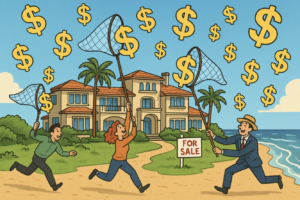👋 Happy Friday! It’s the day before 🎅 Christmas Eve Eve 🤶, and this will be our last newsletter of 2023. I’ll be at our second home in Asheville for the next two weeks to celebrate Christmas and ring in the new year with family. However, if anything needs to be signed for a trust or as a registered agent for a client’s company, we’re still open and taking care of business.
1 big thing: Foreign ownership law falling flat

Florida’s Conveyances to Foreign Entities Act has drawn the ire of some Wall Street and Florida construction industry heavyweights who are lobbying legislators to take action quickly to amend or repeal the law.
Why it matters: The flurry of lobbying activity indicates just how much impact this haphazardly drafted and hastily passed legislation has had in less than six months on Florida’s real estate sector.
Big names on Wall Street and Main Street, like Blackstone, Starwood Capital, Related Cos., and Lennar are coming out in force to roll back the law.
Many blame the Florida governor’s desire to look tough on China during his campaign for President as reasoning for the law.
Yes, but: According to Bloomberg, the law goes beyond only prohibiting Chinese nationals from owning real estate in Florida.
[It] also bans most Chinese capital from being used to fund projects in Florida, choking off a relatively cheap source of financing for an engine of the state’s economy…. Firms with Chinese investors are barred from taking even small, non-controlling stakes in real estate deals under the statute.
By the numbers: Chinese funding has helped make the real estate industry 17% of Florida’s overall GDP, equaling $244 billion in revenue, and generating about 20% of Florida’s tax revenue overall.
-
The Bloomberg article includes a graphic illustrating how the law makes most of Miami-Dade and Broward Counties off-limits to any Chinese real estate financing or ownership.
-
The money for new developments has been drying up as Chinese investors are afraid of running afoul of the governor’s law.
Real estate developers and financiers have been afraid to stand up to the governor based on what he’s done to Disney for defying him in the past. Instead, they’re resorting to lobbying the legislature as an end-run around the governor who could be a lame duck if his presidential run is cut short.
What’s next: In addition to lobbying to knee-cap the statute, the U.S. Department of Justice says the law is unconstitutional, and the ACLU is mounting a legal challenge.
The bottom line: With high-interest rates and an epidemic of vacancies in commercial real estate, China and other foreign nations provided a source of cheap financing. The law—at least as it’s written now—risks damaging the real estate industry and the overall Florida economy unless the lobbying efforts or the court cases can whittle it down to be more reasonable.
2. “Heir Law” Protects Inheritance Rights

As of 2020, Florida requires that (1) all heirs receive notice of an intent to sell or split their property, and (2) all sales or partitions of heir property involve an independent appraisal of the land.
Why it matters: Florida’s law protects property owners by requiring disclosure of partition and sale efforts and independent property appraisals.
-
The law rectifies a longstanding racial injustice. The U.S. Department of Agriculture has described partitioning and selling heir property as “the leading cause of Black involuntary land loss.”
Before the passage of the Uniform Partition of Heirs Property Act, when an individual died without a will, any heir could force a partition or sale of the property.
-
Unscrupulous real estate investors used the loophole to target heirs and coerce sales, often under market value. The result was that heirs would be deprived of property in their families for generations.
State of play: The playing field is leveled by this law.
-
The new law limits the ability of one heir to override the other heirs’ ownership stake.
-
Florida also requires the process to be public, whenever possible, and that all parties have equal access to information about the property and its value.
Yes, but: a comprehensive estate plan can prevent the need for this law to have any effect.
-
Without an estate plan, dozens of people can become heirs to a property, each with an equal share and right to the property.
-
Multiple heirs can make it difficult to determine who’s responsible for taxes and upkeep on the property.
By the numbers: As of 2023, only 34 percent of Americans have an estate plan in place.
More than money. Florida recognizes that the value of a property extends beyond a dollar amount.
-
The bottom line: Courts may now consider sentimental value and family legacy when deciding what to do with a property.
-
Real estate investors can be confident that their property acquisition is above board without the risk of other heirs coming forward or attempting to file suit.
-
It also ensures that property is bought and sold at fair market values.
3. Catch up fast

-
First American Title Company announced this week that it is the victim of a cyber attack. It comes less than a month after Fidelity National Title was the target of an attack. Both attacks put millions of borrowers’ and sellers’ personal financial information at risk and delayed closings. HousingWire
-
Mortgage rates held below 7% for the second week in a row and had the largest weekly drop since November 2022. HousingWire
-
Bills have been filed that, if passed, would prohibit HOA’s from charging a fee to produce an estoppel which is often required to issue title insurance at the sale of a property. Florida House and Senate.
-
Companion bills are also pending that — if passed — would clarify that it’s permissible for property owner to impose easements on their own property. Florida House and Senate.
-
Empty office buildings and zombie malls may meet the same fate. CNN
4. Pic of the day

A new year means resolutions.
Why it matters: Resolving often involves creating a new habit, such as going to a gym regularly, spending more time with our family, or improving ourselves.
What they’re saying: Dr. Katy Milkman, the author of “How to Change,” during a recent podcast, labeled this “The Fresh Start Effect”:
There are moments in our lives that feel like new beginnings: the start of a new week, a birthday, a new role at work or in your family. There’s a sense of a fresh start and clean state that brings an identity shift. You can say, ‘That was the old me that failed to achieve goals.’ You get a clean slate. At the moments that feel like new beginnings, people are more likely to start pursuing goals.
One fun thing: Temptation bundling can help us build habits by coupling a temptation with something we consider a chore.
-
You love to binge TikTok cat videos but don’t like the treadmill. Resolve to only watch the videos when you’re walking on the treadmill.
-
You love to listen to murder mystery podcasts but despise cleaning your house. Resolve to only listen to the podcasts while you’re vacuuming or dusting.
Yes, but: Building a habit may take more or less than 21 days, but the average is over 200 days to create a habit. Knowing some tools of the trade can help us build those habits faster than we did in Auld Lang Syne:
-
Beware of the bias for instant gratification versus the long-term effects the habit will create.
-
Nature and nurture are 50/50. You’re not “stuck” with your nature. You can rewire your brain and body to improve.
-
It’s all about repetition, reward, and consistency. Quick fixes don’t exist, and
-
An advice club can help with tips and tricks you may never consider.
The bottom line: Whether it’s a birthday, holiday, new year, new week, or even a new day, any second can be a fresh start with a clean slate. It’s never too late to try to build a new habit.
We hope you found this helpful — any feedback is appreciated and can be shared by hitting reply or using the feedback feature below.
-
Was this email forwarded to you? Subscribe here.
-
Have an idea or issue to share? Email us.
-
Follow MyLandTrustee and Joseph E Seagle PA on LinkedIN, or subscribe to our YouTube channel!
Be on the lookout for our next issue! 👋
-
Our mailing address: PO Box 547945, Orlando, FL 32854-7945
-
Our physical address: 1901 West Colonial Drive, Orlando, FL 32804





